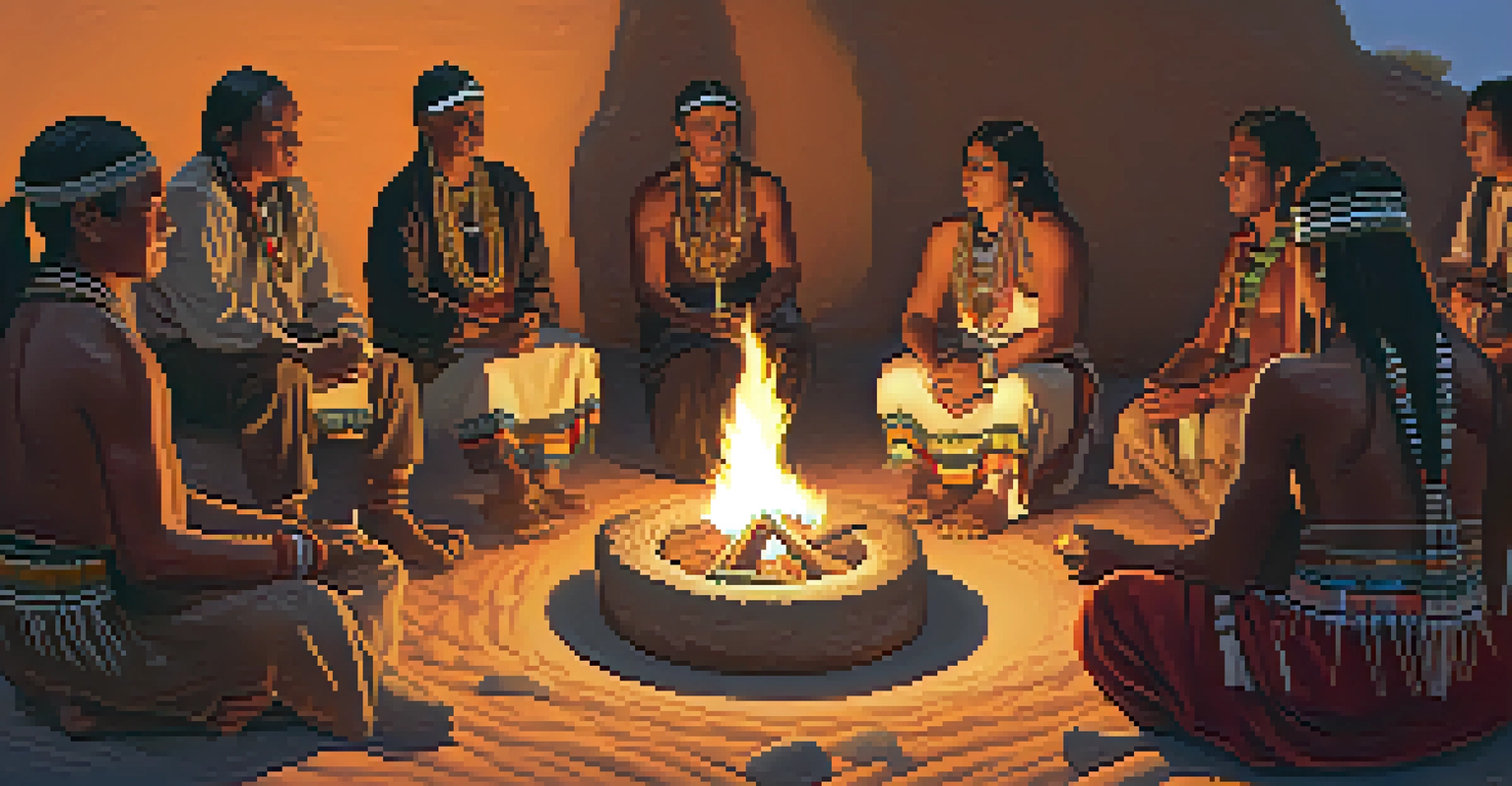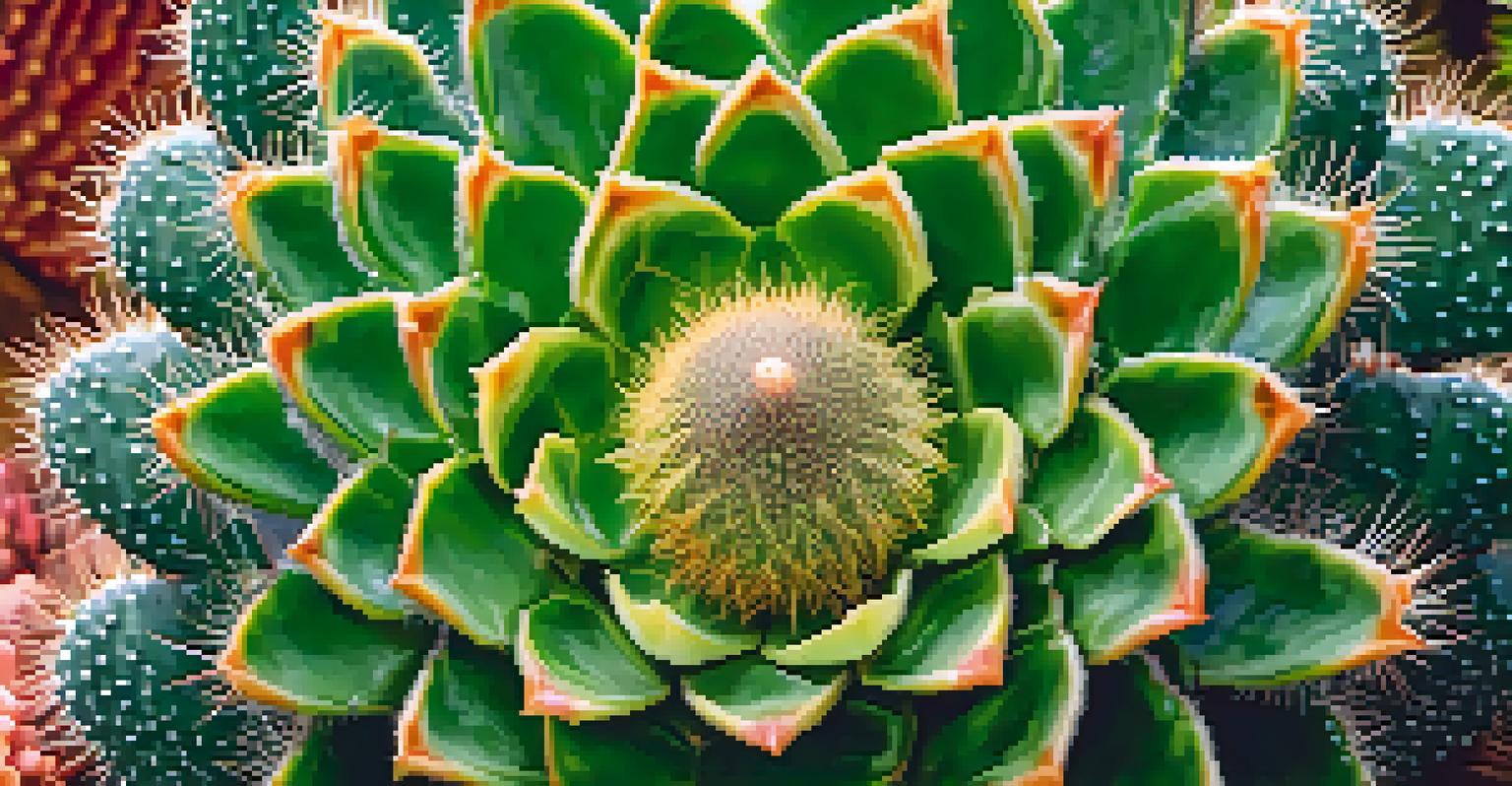Transcendence Through Peyote: A Global Perspective

Understanding Peyote: A Sacred Cactus of the Americas
Peyote, a small spineless cactus native to northern Mexico and the southwestern United States, has long been revered for its psychoactive properties. Traditionally, it has been used in spiritual ceremonies by Indigenous peoples, particularly within the Native American Church. These ceremonies are believed to facilitate profound spiritual experiences, connecting individuals with a higher consciousness or the divine.
The use of peyote in ceremonies is about more than just the drug; it’s a pathway to connect with ancestors, nature, and the cosmos.
The active compound in peyote, mescaline, is responsible for its hallucinogenic effects. When consumed, it can induce altered states of perception, allowing users to experience visions and deep introspection. This transformative journey is often framed within a cultural context, where the intent is to heal, seek guidance, or foster a sense of community.
In essence, peyote serves not just as a substance, but as a bridge to transcendence, enabling individuals to explore their inner selves and the universe around them. The sacredness of this plant is deeply intertwined with the spiritual practices of those who have used it for centuries.
The Role of Peyote in Indigenous Spiritual Practices
For many Indigenous communities, peyote ceremonies are a vital aspect of cultural identity. These rituals often involve songs, prayers, and communal gatherings that strengthen bonds among participants. The experiences shared during these ceremonies can lead to collective healing and understanding, reinforcing the importance of tradition.

One well-known example is the Native American Church, which integrates Christian beliefs with Indigenous practices. Members partake in peyote to seek spiritual insights, personal growth, and healing from emotional or physical ailments. This blend of cultures illustrates how peyote serves as a unifying force across different belief systems.
Peyote's Spiritual Significance
Peyote is deeply rooted in Indigenous spiritual practices, serving as a bridge to personal and communal healing.
Ultimately, the use of peyote in these traditions is about more than just the drug; it’s a pathway to connect with ancestors, nature, and the cosmos. It embodies a holistic approach to spirituality that emphasizes harmony and balance within one's self and the community.
Scientific Insights: Peyote and the Brain
Recent scientific studies have begun to shed light on how peyote and its active compound, mescaline, affect the brain. Researchers have found that mescaline interacts with serotonin receptors, which play a key role in mood regulation and perception. This interaction can lead to enhanced emotional experiences and altered states of consciousness.
As interest in psychedelics grows, people from various backgrounds are exploring peyote for personal and spiritual growth.
One fascinating aspect of these studies is the reported therapeutic potential of mescaline. Some findings suggest that it may help alleviate symptoms of anxiety, depression, and PTSD. The structured, guided experiences with peyote during ceremonies could provide a safe environment for individuals to confront and process difficult emotions.
This emerging research is paving the way for a broader understanding of how peyote can contribute to mental health and well-being. As scientific exploration continues, it’s essential to respect the cultural significance of peyote while acknowledging its potential benefits in modern therapeutic settings.
Global Perspectives: Peyote Beyond the Americas
While peyote is most commonly associated with Indigenous cultures in North America, its influence has begun to extend globally. As interest in psychedelics grows, people from various backgrounds are exploring peyote for personal and spiritual growth. This phenomenon raises important questions about cultural appropriation and the ethical use of sacred plants.
In countries outside the Americas, individuals often seek peyote experiences in controlled, respectful environments. These settings aim to honor the traditions and teachings surrounding peyote use, creating a dialogue between Indigenous knowledge and modern spiritual seekers. This exchange can foster greater awareness and appreciation for the plant's cultural roots.
Therapeutic Potential of Mescaline
Research indicates that mescaline, the active compound in peyote, may alleviate symptoms of anxiety, depression, and PTSD.
Ultimately, the global interest in peyote highlights a shared human desire for transcendence and understanding. It encourages a respectful exploration of how different cultures interpret and engage with these sacred practices.
Challenges and Controversies Surrounding Peyote Use
Despite its rich history and spiritual significance, the use of peyote is not without controversy. The increasing popularity of psychedelics has led to concerns about overharvesting and the sustainability of peyote populations in the wild. As demand rises, there is a pressing need to balance spiritual use with conservation efforts.
Moreover, the commercialization of peyote experiences can dilute their cultural meaning. Many Indigenous leaders emphasize the importance of preserving the integrity of peyote ceremonies, advocating for responsible practices that honor the plant's sacredness. This conversation is crucial as more people seek out these experiences without understanding their roots.
Navigating these challenges requires a collective effort to promote education, respect, and sustainability. By fostering a deeper understanding of peyote's cultural significance, we can work toward a future where its powerful potential is honored and preserved.
Personal Journeys: Testimonials from Peyote Users
Many individuals who have participated in peyote ceremonies describe their experiences as life-changing. They often report feelings of profound connection to nature, insights into personal struggles, and a renewed sense of purpose. These testimonials highlight the transformative power of peyote when used in a respectful and intentional manner.
For instance, one participant shared how a peyote ceremony helped them confront deep-seated fears and grief, leading to a profound sense of healing. The shared stories of others can serve as inspiration for those considering embarking on their own spiritual journeys with peyote.
Cultural and Ethical Considerations
The global interest in peyote raises important questions about cultural appropriation and the need for sustainable practices.
Such personal narratives not only enrich our understanding of peyote's impact but also emphasize the importance of community in these experiences. The support and shared wisdom found in group settings can amplify the healing potential of peyote, reinforcing the idea that we are all interconnected in our quests for meaning.
Future Directions: Research and Cultural Preservation
As interest in peyote and its psychoactive properties continues to grow, the need for responsible research and cultural preservation becomes increasingly important. Scientists and Indigenous communities alike are advocating for studies that respect traditional practices while exploring the potential benefits of peyote. This collaborative approach could lead to groundbreaking discoveries in both science and spirituality.
Furthermore, efforts to protect peyote habitats and ensure sustainable harvesting practices are crucial for the future of this sacred plant. Engaging local communities in conservation efforts can empower them to take an active role in preserving their cultural heritage and the natural environment.

Looking ahead, the dialogue between researchers, Indigenous leaders, and spiritual seekers will be vital in shaping the future of peyote use. By honoring its cultural roots and exploring its potential benefits, we can cultivate a deeper appreciation for this remarkable plant and the wisdom it offers.